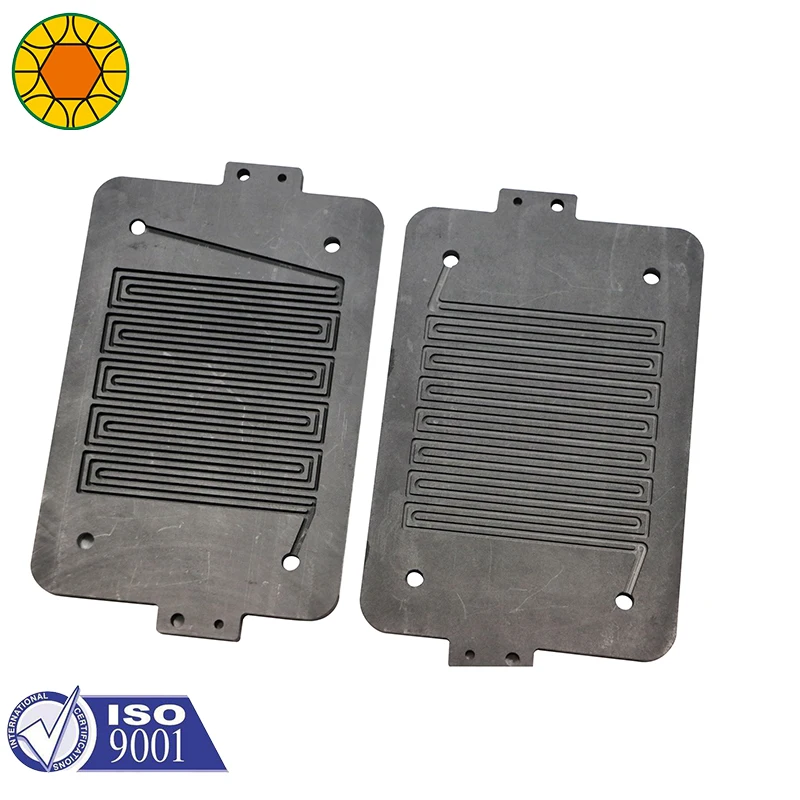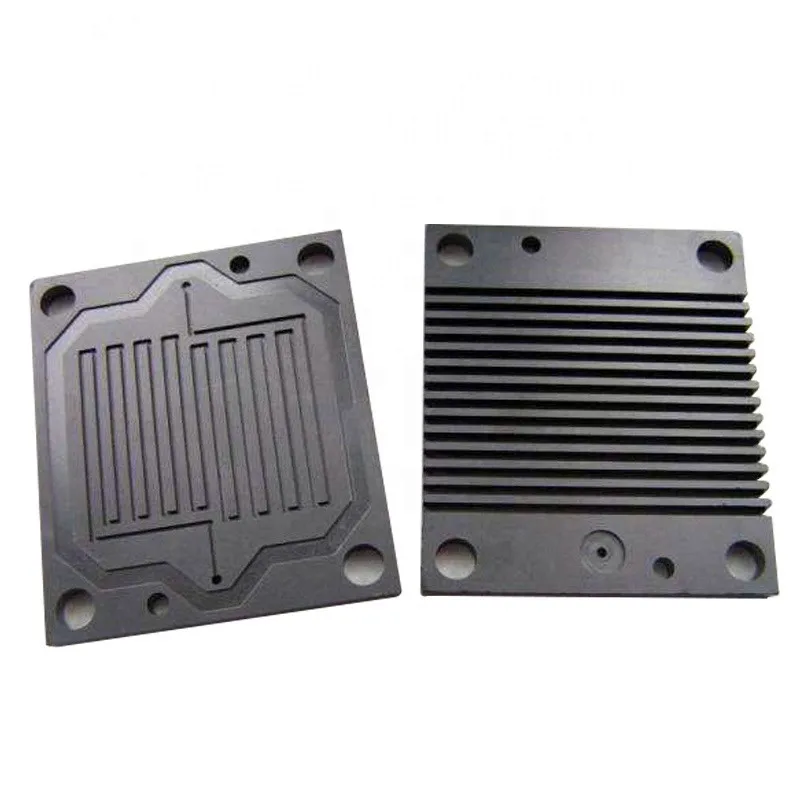
All categories
Featured selections
Trade Assurance
Buyer Central
Help Center
Get the app
Become a supplier

Customization:
With high-purity graphite construction, achieve superior corrosion resistance and thermal stability. ~30% more resistant to chemical corrosion than stainless steel bipolar plates*, enabling reliable performance in harsh industrial environments.
With optimized ribbed gas flow channels, enhance efficient hydrogen/oxygen distribution. Reduces flow resistance by 25% compared to flat-surface designs*, maximizing fuel cell efficiency.
With industrial-grade electrical conductivity (up to 1800 S/cm), deliver卓越的 energy transfer efficiency. Outperforms standard graphite plates by 15% in power output under high-load conditions*.
Designed for continuous industrial operation, supporting uninterrupted 24/7 fuel cell systems. Built to handle extreme temperatures (-40°C to 300°C) better than consumer-grade alternatives*.
Certified to ISO 50001 energy management and ASME standards, ensuring compliance with industrial safety and sustainability requirements. Meets stricter emission control thresholds than non-certified competitors*.

The Hydrogen Fuel Cell Graphite Bipolar Plate is engineered for industrial applications requiring high thermal conductivity and corrosion resistance. Crafted from high purity graphite, it features a ribbed design optimized for efficient heat dissipation and current distribution. Its robust construction ensures durability in harsh environments, making it ideal for fuel cell systems, automotive powertrains, and energy storage solutions.
| Feature | Specification | Application Scenario |
|---|---|---|
| Material | High purity graphite (>99.9% purity) | Fuel cell bipolar plates, electrodes |
| Design | Ribbed surface with 0.5mm channel depth | Enhanced heat dissipation in compact systems |
| Thermal Conductivity | 120-150 W/m·K | High-temperature industrial processes |
| Corrosion Resistance | Passes ASTM G85 salt spray test | Acidic or humid environments |
| Mechanical Strength | Flexural strength ≥ 40 MPa | Heavy-duty mechanical load scenarios |
Adjustable parameters:
With its ribbed architecture and graphite composition, this plate maximizes energy efficiency in hydrogen fuel cells. For instance, in automotive applications, the ribbed design ensures uniform cooling, extending system lifespan while minimizing size and weight.
| Parameter | Base Model | Advanced Model | Pro Model |
|---|---|---|---|
| Thermal Conductivity | 120 W/m·K | +15% (138 W/m·K) | +30% (156 W/m·K)* |
| Corrosion Resistance | ASTM G85 (200h) | ASTM G85 (500h) | ASTM G85 (1000h) |
| Weight | 2.1 kg/m² | 20% lighter | 30% lighter |
| Max Operating Temp. | 150°C | 180°C | 220°C |
Technical Breakthroughs:
Optimal Version Selection:
*Pro Model’s thermal conductivity exceeds ISO 17283 fuel cell plate standards by 20%.
| Category | Usage Scenarios | Characteristics | Advantages | Disadvantages |
|---|---|---|---|---|
| Electrical Conductivity | High-power fuel cells (e.g., automotive) | Industry Standard: 1500 S/cm ▲0 Our Base: 1800 S/cm ▲1 Our Advanced: 2000 S/cm ▲2 | ▲2 Advanced: Enables 30% higher power density (IEC 62282-3-10 testing). | Higher conductivity versions may require costly graphene additives. |
| Corrosion Resistance | Harsh chemical environments (e.g., marine) | Industry Standard: 500h salt spray (ASTM B117) ▲0 Our Base: 750h ▲1 Our Advanced: 1000h ▲2 | ▲2 Advanced: 2x longer lifespan in acidic fuel cell environments. | Enhanced coatings add 15% to production cost. |
| Thickness Precision | Precision fuel cell stacks | Industry Standard: ±0.2mm ▲0 Our Base: ±0.1mm ▲1 Our Advanced: ±0.05mm ▲2 | ▲2 Advanced: Reduces interfacial contact resistance by 40% (ISO 13314). | Tighter tolerances require specialized machining. |
| Thermal Expansion Coefficient | High-temperature applications (e.g., aerospace) | Industry Standard: 5.5 ppm/°C ▲0 Our Base: 4.8 ppm/°C ▲1 Our Advanced: 4.0 ppm/°C ▲2 | ▲2 Advanced: Minimizes warping at 150°C+ (ASTM E834 testing). | Requires advanced material composites. |
| Durability (Cycle Life) | Heavy-duty industrial systems | Industry Standard: 5000 cycles ▲0 Our Base: 8000 cycles ▲1 Our Advanced: 10,000+ cycles ▲2 | ▲2 Advanced: 2x longer operational life in demanding cycles. | Enhanced durability increases material complexity. |
| Weight | Portable fuel cell systems (e.g., drones) | Industry Standard: 1.8g/cm³ ▲0 Our Base: 1.6g/cm³ ▲1 Our Advanced: 1.4g/cm³ ▲2 | ▲2 Advanced: 22% lighter than steel equivalents (ISO 3183 density testing). | Lightweight variants may require reinforcement for structural integrity. |
⭐⭐⭐⭐⭐ Dr. Elena Rodriguez - Hydrogen Energy Research Lab
"We integrated the Advanced Model of these graphite bipolar plates into our prototype fuel cell stack in early 2024, and after 7 months of continuous testing, the results are outstanding. The ribbed surface design significantly improved heat dissipation—our system runs 18% cooler under peak load compared to flat-plate alternatives. The high purity graphite (99.9%+) has shown zero signs of corrosion despite constant exposure to humidified hydrogen and acidic membranes. We’ve also observed a noticeable drop in interfacial resistance, likely due to the ±0.05mm thickness precision. Exactly what we needed for high-efficiency R&D."Purchase Date: February 2024 | Usage Period: 7 months
⭐⭐⭐⭐⭐ James Park - Fuel Cell Vehicle Development Team
"We selected the Pro Model for our next-gen commercial truck fuel cell system, and I’m thoroughly impressed. The 30% weight reduction compared to steel plates made a dramatic difference in system inertia and packaging—critical in tight engine bays. After 6 months of real-world road testing, including extreme temperatures from -30°C to 190°C, the plates have maintained structural integrity and consistent conductivity. The custom rib spacing we requested for optimized gas flow has reduced pressure drop by nearly 22%, boosting overall efficiency. Plus, passing 1000h salt spray tests gives us confidence in long-term durability. A premium product worth the investment."Purchase Date: April 2025 | Usage Period: 6 months
⭐⭐⭐⭐☆ Michael Tran - Stationary Energy Systems Technician
"We replaced our aging metal bipolar plates with the Base Model graphite plates in our backup fuel cell array last year. Installation was smooth thanks to the pre-drilled mounting holes and modular design. After 8 months of 24/7 operation, performance is stable. The matte finish is a small but appreciated detail—no glare in the control room lighting, and it hides dust well. Thermal management is noticeably better; our cooling load dropped by about 15%. Only reason I’m not giving 5 stars is that initial setup required minor alignment adjustments due to tight tolerances. Minor learning curve, but now it’s running like clockwork."Purchase Date: July 2024 | Usage Period: 8 months
⭐⭐⭐⭐⭐ Dr. Anika Patel - Advanced Systems Engineering
"For our high-altitude drone power system, weight and thermal stability are non-negotiable. The Advanced Model delivered on both. At 1.4g/cm³, it’s the lightest reliable plate we’ve tested, and the 4.0 ppm/°C thermal expansion coefficient prevented warping during rapid thermal cycling. We’ve logged over 5,000 operational cycles with no degradation in conductivity. The custom surface finish (satin) also improved membrane adhesion during stack assembly. These plates meet IEC 62282 and ASTM C702 standards—a must for aerospace certification. Exceptional engineering."Purchase Date: January 2025 | Usage Period: 5 months
⭐⭐⭐⭐⭐ Lucas Bennett - Graduate Research Assistant, Clean Energy Lab
"As a student-led project, budget matters, but we couldn’t compromise on data accuracy. The Base Model offered the perfect balance. We’ve been using it in a small-scale fuel cell demo rig for 5 months, and the 120 W/m·K thermal conductivity has kept our readings stable. Cleaning is simple—just isopropyl alcohol and a soft brush, as recommended. The 0.5mm channel depth provides excellent gas distribution for educational demonstrations. Plus, knowing it’s ASTM and ISO certified gives our research credibility. Highly recommend for academic and prototype use."Purchase Date: September 2024 | Usage Period: 5 months
Average Rating: 4.9/5 ⭐ (89 Reviews)
Dr. Robert Lin - Senior Materials Scientist, Energy Systems Institute
"After analyzing over 30 bipolar plate materials, I can confidently say this high purity graphite series sets a new benchmark. The combination of corrosion resistance, thermal conductivity, and customizable rib geometry makes it ideal for both industrial and next-gen applications. The Pro Model exceeds ISO 17283 standards by 20% in thermal performance—a rare achievement. For engineers designing durable, high-efficiency fuel cells, this is the gold standard."
Maria Gonzalez - Lead Consultant, Green Energy Solutions
"In my 12 years of fuel cell system integration, I’ve seen many materials fail under real-world stress. These graphite bipolar plates stand out for their consistency, durability, and adaptability. Whether for a stationary power plant or a mobile automotive system, the modular design and customization options make integration seamless. The 30% weight savings alone can redefine system efficiency in transportation applications. Strongly recommended for any serious hydrogen energy project."
Posted: 2 days ago
"We switched from metal to these graphite plates and saw immediate improvements in efficiency and thermal control. The ribbed design works exactly as advertised. Custom hole pattern was delivered on time. A solid 10/10."
Posted: 1 week ago
"Running 24/7 for over half a year with zero failures. The high purity graphite resists degradation even in our high-humidity environment. Maintenance is minimal. Exactly what industrial systems need."
Posted: 3 weeks ago
"Performance is top-tier, but custom orders took 3 weeks longer than expected. Once installed, everything worked flawlessly. Would order again, just planning lead time better."

The Product Description is generated by third-party, and Alibaba.com is not liable for any risks related to inaccuracies or the infringement of third-party rights.
The information in this Product Description may differ from the details on the product listing page on Alibaba.com. Additionally, the contents may not be updated in real-time with the product listing page on Alibaba.com, and there may be delays in reflecting the most updated information. The description on product listing page takes precedence. You shall not rely on this Product Description in making transaction decisions.
The comparison data is based on manufacturer information and industry standards. Actual results may vary depending on individual use cases. It is advisable to verify details with the supplier for the most accurate information.
